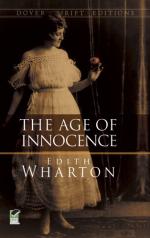Archer had pictured often enough, in the first impatient years, the scene of his return to Paris; then the personal vision had faded, and he had simply tried to see the city as the setting of Madame Olenska’s life. Sitting alone at night in his library, after the household had gone to bed, he had evoked the radiant outbreak of spring down the avenues of horse-chestnuts, the flowers and statues in the public gardens, the whiff of lilacs from the flower-carts, the majestic roll of the river under the great bridges, and the life of art and study and pleasure that filled each mighty artery to bursting. Now the spectacle was before him in its glory, and as he looked out on it he felt shy, old-fashioned, inadequate: a mere grey speck of a man compared with the ruthless magnificent fellow he had dreamed of being. . . .
Dallas’s hand came down cheerily on his shoulder. “Hullo, father: this is something like, isn’t it?” They stood for a while looking out in silence, and then the young man continued: “By the way, I’ve got a message for you: the Countess Olenska expects us both at half-past five.”
He said it lightly, carelessly, as he might have imparted any casual item of information, such as the hour at which their train was to leave for Florence the next evening. Archer looked at him, and thought he saw in his gay young eyes a gleam of his great-grandmother Mingott’s malice.
“Oh, didn’t I tell you?” Dallas pursued. “Fanny made me swear to do three things while I was in Paris: get her the score of the last Debussy songs, go to the Grand-Guignol and see Madame Olenska. You know she was awfully good to Fanny when Mr. Beaufort sent her over from Buenos Ayres to the Assomption. Fanny hadn’t any friends in Paris, and Madame Olenska used to be kind to her and trot her about on holidays. I believe she was a great friend of the first Mrs. Beaufort’s. And she’s our cousin, of course. So I rang her up this morning, before I went out, and told her you and I were here for two days and wanted to see her.”
Archer continued to stare at him. “You told her I was here?”
“Of course—why not?” Dallas’s eye brows went up whimsically. Then, getting no answer, he slipped his arm through his father’s with a confidential pressure.
“I say, father: what was she like?”
Archer felt his colour rise under his son’s unabashed gaze. “Come, own up: you and she were great pals, weren’t you? Wasn’t she most awfully lovely?”
“Lovely? I don’t know. She was different.”
“Ah—there you have it! That’s what it always comes to, doesn’t it? When she comes, she’s different—and one doesn’t know why. It’s exactly what I feel about Fanny.”
His father drew back a step, releasing his arm. “About Fanny? But, my dear fellow—I should hope so! Only I don’t see—”
“Dash it, Dad, don’t be prehistoric! Wasn’t she— once—your Fanny?”




